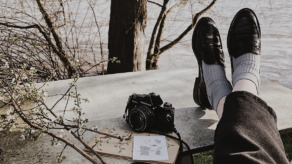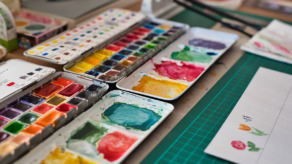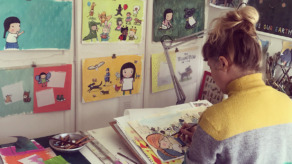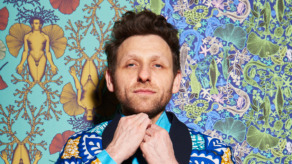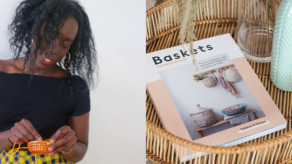Why learning something new makes us happy

When she finally found the time to take that online philosophy course, journalist Hagar Jobse rediscovered how happy learning something new makes her. She shares a valulable lesson in a time when the world is changing so fast.
‘My stay-at-home knowledge retreat’ is how I often refer to the period when the COVID-19 pandemic first hit. I devoured one book after the other, improved my audio-editing skills, took an online course in Eastern philosophy and listened to dozens of podcasts on psychology and personal growth. With so many of my social activities and work appointments canceled, I had tons of time left to learn new things.
It reminded me of the time before I turned 25, when my life mainly consisted of learning. After burying myself in my books at high school, I immersed myself in knowledge during my five-year history program at university. For me, university was like a playground; it was the first time I was free to choose what I wanted to learn from a broad offering of interesting subjects. This came to an abrupt end when I started working professionally about eight years ago. There are naturally a lot of things I learned in practice after graduating—such as how to pitch a story, or how to negotiate rates and find new clients—and yet the focus continued to shift toward making a living. It was hard for me to make the time to take a course or read a complex book. After all, the bills had to be paid so there was always a job that took priority.
The Switch to Online
I dove into new information because I suddenly had the time, but other people had to do this out of necessity. Teachers had to shift to teaching online, and countless freelancers had to retrain at lightning speed to become online entrepreneurs. For years, dance teacher Jennifer Leijendekkers had been entertaining the notion of giving online classes, but just never got around to it. This changed when she lost over half of her income within a week.
“I made a video with my phone, downloaded an editing program and got started,” she says. This resulted in a well-oiled online system that parents can use to order dance videos for their children. “But,” she admits, “it wasn’t easy. I knew nothing at all about editing and had to figure it all out myself. I often sat there pulling my hair out.” After a lot of practice, she even started to enjoy it. “I even worked with special effects after a while, and had butterflies fly across the screen in a few of my videos.” And the experience proved very valuable for her. “I found out I’m a lot more flexible than I thought,” she says.
A strong drive
For yoga teacher Neel van Leeuwen, the ‘lockdown’ period was actually the push she needed. Her fear of cameras had been holding her back from doing something online for years. “Every time someone pointed a camera at me, I would freeze up completely,” she says. “Now I had a really strong drive to be there for my students, so I decided to just get over my fear.” This led to her giving yoga sessions every morning via Zoom. “It was really strange at first, but I got so many positive responses from people who got a lot out of my online classes,” she says. She’s no longer afraid of posing for a camera: “I know now that there was no reason for keeping myself in the background so much.”
Setting Priorities
One of the things that this time made abundantly clear was that we must constantly reinvent ourselves. Granted, this time there was an urgent reason for us to adapt, but developments such as computers and robots that take over human tasks have been around for decades. A Deloitte study shows that two to three million of today’s jobs will no longer exist in the future. Consulting firm McKinsey & Company recommends that, in order to avoid being out of a job, it’s a good idea to spend at least half of a workday each week learning new things.
An employment market director for a multinational recruitment agency, Marjolein ten Hoonte emphasizes the importance of flexibility. “We used to get rewarded for doing the same work at the same place for a long enough period of time,” she says. “Nowadays, these ‘jobs for life’ are actually becoming increasingly more scarce.” According to her, we’re expected to be as mobile and flexible as possible. The more varied your skills, the better. “To me,” she says, “acquiring new knowledge and skills isn’t a matter of having time, but of setting priorities.”
Fulfilling
According to futurist Jeanneke Scholtens, the fact that we still find it hard in our busy everyday lives to place a priority on this is mainly because we view learning as a must. “As children, we are taught that
we will have to study hard if we want to accomplish anything,” she says. “And preferably within the fixed framework of school and college.”
Continuously learning new things can actually be very fulfilling. “Getting better at something is an intrinsic human desire,” says psychologist and author Ap Dijksterhuis. When you do something that challenges you—such as reading a complicated book or writing a difficult report—you can also experience a so-called feeling of flow. “During uncertain times, you lose track of time and get completely wrapped up in what you’re doing,” Dijksterhuis says. “Research has shown that people who have these types of ‘flow’ experiences are happier.” According to Scholtens, there are even more aspects of learning that contribute to experiencing more happiness in our lives. “The more you grow and develop, the more open you are to other people’s opinions and visions,” she says. “This often leads to an intensification of your relationships.”
I noticed this too. The conversations with my friends were no longer only about work and relationships, but also about happiness, being able to allow pain in and setting our own boundaries. And I took the time to focus on each of these themes myself too.
Learning new things
By regularly challenging ourselves, we are also training our brains, and learning new things gets increasingly easier. “Our brains consist of connections which get stronger the more frequently you do something,” says psychologist Thijs Launspach. The only danger is that you get stuck in one activity even though it’s better to keep training your capacity to learn new things—preferably by doing something that doesn’t really come naturally to you. “If your job involves writing, I would recommend learning something that’s not so language-related,” Launspach says. “Building your own website, for example.”
Architect of Your Own Brain
Despite the countless advantages, not everyone can take on new challenges successfully. Psychologist Carol Dweck spent years doing research at Stanford University in the US on motivation, performance and success. In 2000, she introduced the terms ‘fixed mindset’ and ‘growth mindset’. Her research showed that children who think that their level of intelligence is a fixed given are less inclined to take on new challenges than children who are convinced that they ultimately get better at something through practice.
These different mindsets are influenced to a great degree by our environment. Dweck showed that teachers who firmly believe that you can train your brain are better at motivating students to make an effort than teachers who believe that talent is what determines performance. In today’s rapidly changing world, a growth mindset is incredibly valuable. If you are confident that you can teach yourself new things, you will be more flexible in adapting to change on the work floor and the job market.
Brains are malleable
For a long time, the prevailing belief was that our brains can’t be shaped after we reach a certain age. Nothing could be further from the truth: Our brain can make new connections even at an advanced age; we can in fact teach ourselves new things. Neuropsychologist Margriet Sitskoorn has written that our brains are malleable, but that for whatever reason, we don’t often give ourselves enough time to learn what we would like to—and this makes us more of a user than an architect of our brain.
It’s Never too Late
Someone who is the ultimate architect of their own brain is Charlotte van ’t Wout. She has already switched careers several times, having started out as a journalist before founding Spot, a company that rents out historic canal houses in the Netherlands as meeting rooms. Later, she came up with the ‘Instagram class’ concept for her C.Academy, in which she focuses on entrepreneurs, among others. “I spend 60 percent of my time learning new things,” she says. She has read hundreds of books on psychology, personal development and mindset, and spent thousands on seminars and classes on these topics. She also taught herself photography, how to edit videos and make podcasts.
“I give myself exactly 100 hours to master a certain skill,” she says. “During that time, I watch YouTube tutorials, read books and practice a lot, and keep going until I can do it.” She’s convinced that we can teach ourselves anything. “It makes me more flexible and gives me a secure feeling,” she says. “I know now that I’ll be fine, no matter what happens.” And this appears to be true. Van ’t Wout managed to shift her focus from Spot to C.Academy right before the world started to shake on its foundations. “Without that shift, I wouldn’t have had any income,” she says. “I naturally didn’t see this huge change coming, but I’ve always thought it was risky to put all my eggs in one basket.”
Free course
Even though Van ’t Wout has spent a lot of money on expensive seminars, much of what she has learned is available free online. “You really don’t have to enroll in an expensive training course to learn new things,” Scholtens says. “More and more initiatives have been created over the past ten years that make learning at any age possible.” She is currently taking a free online course by Yale University on the science of well-being which really comes in handy for her study on the future of enjoyment.
Emotional skills
According to Ten Hoonte, the problem is that today’s society doesn’t place a high enough value on these other forms of independent study. “We are usually judged based on the diplomas and certificates we have,” she says. “This is a shame; in addition to conventional education, we also learn an incredible amount that cannot be expressed on a piece of paper.” On the work floor for example, particularly during COVID. A crisis is a perfect time to pursue development, whether it’s out of necessity or not. This doesn’t just apply to knowledge, but also emotional skills. Ten Hoonte cites people working in health care as an example. “The COVID-19 pandemic really put their resilience to the test, and most of them appeared—and still do appear—to be up to the task,” she says. “This experience taught them a lot about themselves.”
According to Ten Hoonte, a future awaits us in which learning new things becomes a part of our everyday lives. And even though it was hard for me to free up time for this before the pandemic, it’s music to my ears now. Thanks to the situation I found myself in, I was able to realize how happy learning new things makes me. I don’t see this changing anytime soon.
Want to read more?
- Train Your CEO Brain: And Become Your Best Self, by Margriet Sitskoorn
- Use Your Head: How to Unleash the Power of Your Mind, by Tony Buzan
Text Hager Jobse Photography Joel Muniz/Unsplash.com
